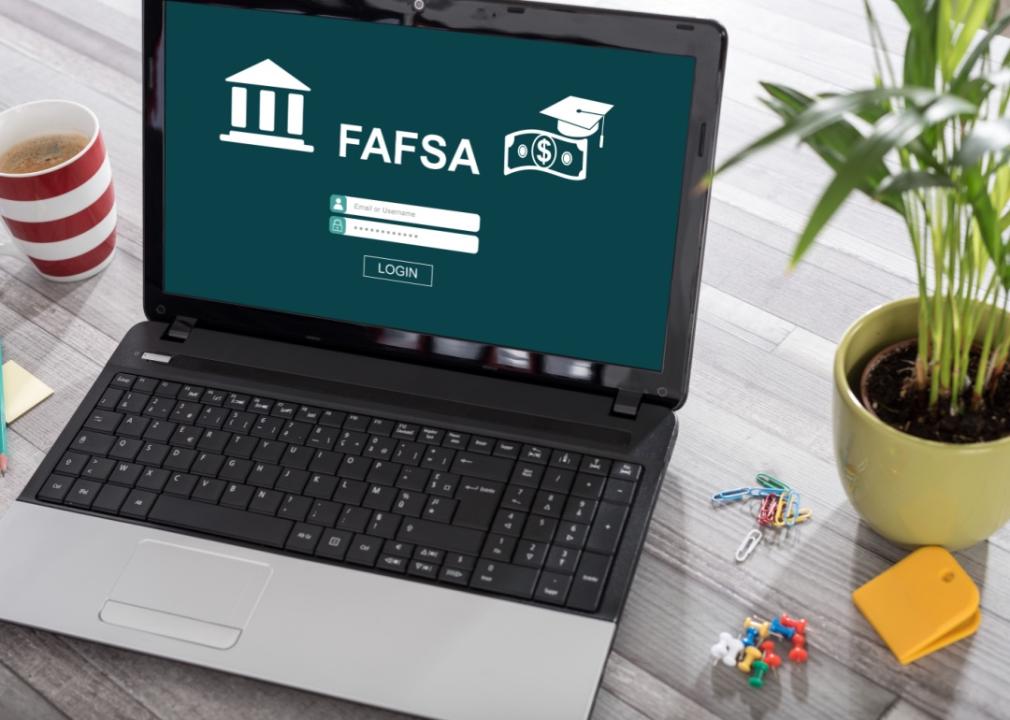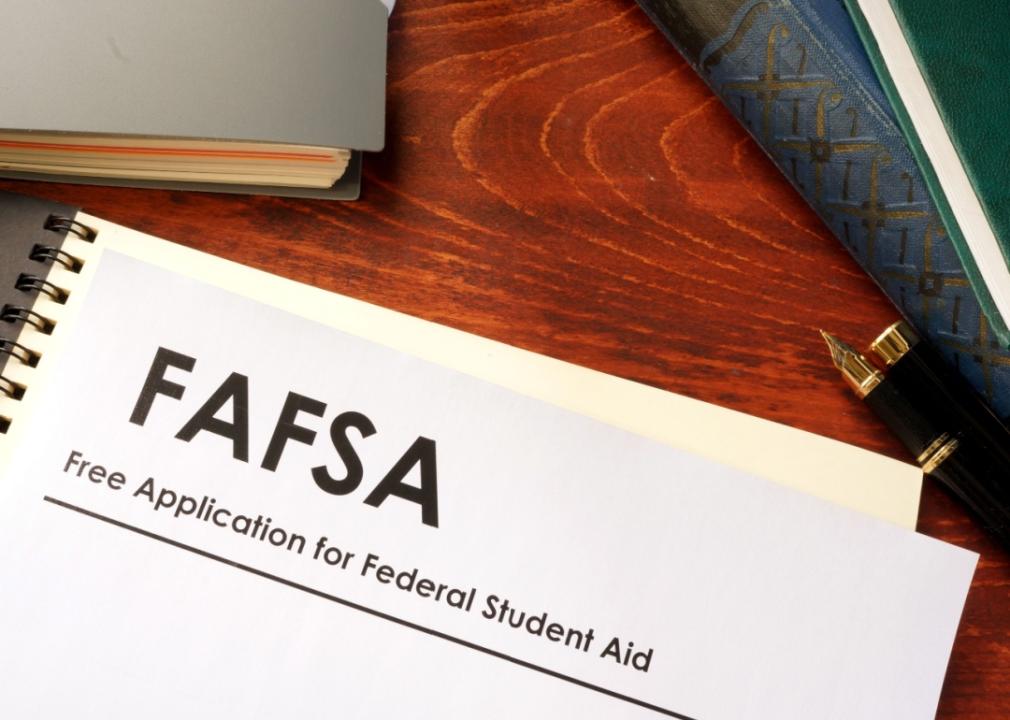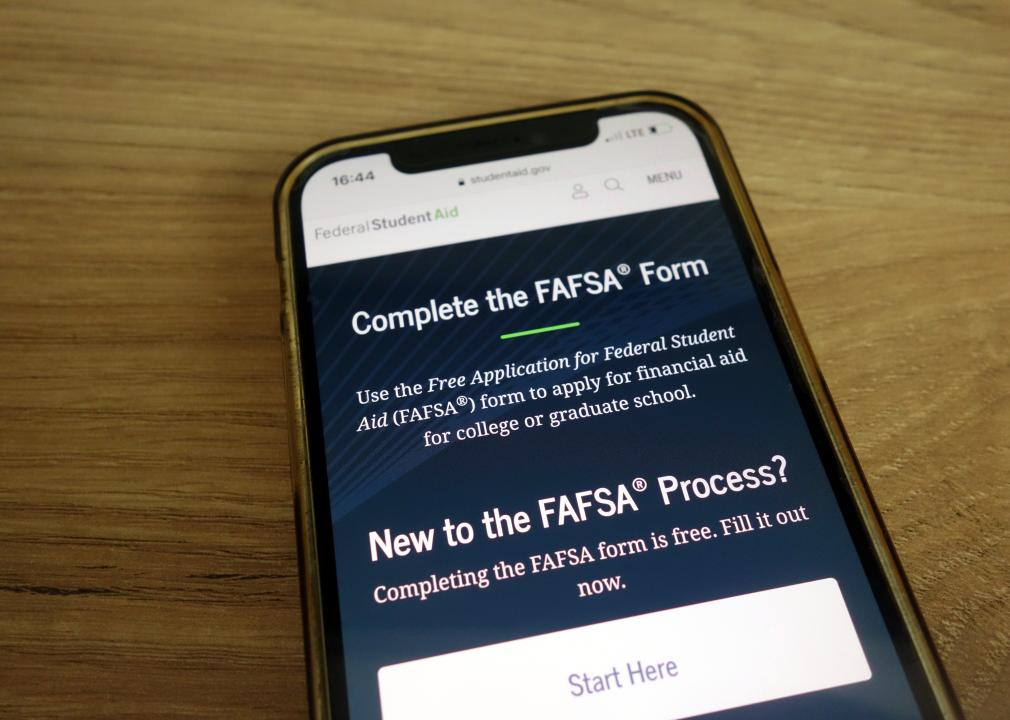9 tips for applying for FAFSA as new, simplified form rolls out this year

thodonal88 // Shutterstock
9 tips for applying for FAFSA as new, simplified form rolls out this year
A laptop on a desk with FAFSA concept on the screen.
Applying for federal student aid has always been a necessary process, but never a simple one. This year, the federal government rolled out a new, supposedly simplified version of the application form online.
Bold.org analyzed resources from the Department of Education, the National College Attainment Network, and news reports to compile this list of tips for students to get a head start on FAFSA applications for the 2024-25 school year. The aid varies depending on a student’s household income and other factors and isn’t available to noncitizens or Deferred Action for Childhood Arrivals recipients.
FAFSA, or the Free Application for Federal Student Aid, has been a lifeline for students who couldn’t afford a college education without it since 1992. Congress added it to the Higher Education Act, intending to bring equal opportunity to college admissions.
Students can apply either through the online portal or by mailing in a printable PDF. The FAFSA form serves two purposes: to gauge your qualification for federal aid and grants and scholarships at the state level.
The rollout of the new application form has been plagued with unfortunate technical problems that have students hanging in the balance, wondering if they’ll receive enough assistance to attend the school of their dreams. Though the feature hasn’t worked perfectly for everyone, a new integration with the IRS enables applicants to seamlessly pull in income and tax information, simplifying a previously onerous process. The new application format was supposed to be more straightforward and generous in calculating aid for lower-income applicants.
Hiccups with the new FAFSA forms started with a delayed rollout of the updated online submission form. Typically, the form is available beginning on Oct. 1 each year, but it wasn’t reliably accessible until the second week of January 2024. Delays in the information on applications reaching schools, miscalculations for needed aid money, and vendor errors the Department of Education discovered in March created even more trouble for hundreds of thousands of applicants and financial aid offices nationwide.
The National College Attainment Network tracks FAFSA applications and submission data. It has seen a lower rate of high schoolers completing applications than in typical years before the new form.
As of May 3, just over 38% of high school seniors from the class of 2024 completed the form, down from 20.5% at the same time the year before. The organization attributes the decline mostly to the late rollout and technical issues, but NCAN communication director Matthew Odom told Stacker some high school graduates may have also been discouraged by headlines about errors and delays.
Given the factors outside applicants’ control in the aid process, it’s never too soon to begin the submission. If you’d like an estimate of the assistance you may get, check out the federal estimator tool here. The strategies below can help your application process run smoothly.
![]()
Piotr Swat // Shutterstock
Gather your documents and set aside at least an hour
Website for filling the FAFSA form displayed on a mobile phone.
The Department of Education estimates that completing the FAFSA aid application will take at least one hour. To prevent the process from dragging out, prepare the documents and information you’ll need ahead of time.
Dependent students will need their parents’ information for all documents; people applying who are married need their spouse’s information, including the following.
– Social Security numbers and recent tax documents or returns.
– Records of untaxed income received, including child support, income from interest, or veterans benefits unrelated to education.
– Account balances for savings and checking accounts and information about any cash. Dependent students need parents’ business information if they are owners.

GalacticDreamer // Shutterstock
Know whether you’re a dependent or independent student
A young woman taking notes by hand while seated in front of a laptop.
One of the first things a student should determine is whether they qualify as dependent or independent. A dependent student relies on their parents at least in part for their financial well-being. An independent student is not required to submit parental or guardian information during the FAFSA process.
You might be an independent student if you are a military veteran, support children, have been an orphan, were in foster care, or were a ward of the court after age 13. Independent students are also those legally emancipated as a minor, are in a legal guardianship with someone other than a parent or stepparent, or were homeless in the last year.
Tero Vesalainen // Shutterstock
Give yourself time to make an FSA ID
Student working on laptop with paper forms in front of them.
It can take up to three days for an FSA ID to be activated so that you can actually submit it, so don’t wait until the last minute. Each parent also needs an FSA ID if the applying student is a dependent. The Department of Education warns that students and parents sharing the same FSA ID across the student and parent forms can create delays.
TukkataMoji // Shutterstock
Contact your state’s education agency to confirm filing deadlines
A close up of someone using a red marker to circle the 10th day on a paper calendar.
Because the FAFSA gauges applicants’ qualifications for both federal aid and state grants and scholarships, different deadlines apply. The federal deadline is 11:59 p.m. Central on June 30. Applicants can make corrections and updates to the form until 11:59 p.m. Sept. 14.
You can visit the Department of Education’s contacts page to look up your state department of education and find more info on your deadlines.
Tero Vesalainen // Shutterstock
If you’re considering more than one school, include them all on your form
A person typing on a laptop with paper college forms also on the desk.
Some applicants might be concerned that showing all school preferences on their FAFSA form might hurt their chances of acceptance at their top choice school. However, schools don’t see the additional choices on your FAFSA, according to the Department of Education, so go ahead and add all of the schools you’re considering applying to your form. You can add as many as 10 schools at a time.
Lopolo // Shutterstock
Don’t confuse the parent portion with the student portion
A woman and a teenage girl looking at laptop together.
Dependent students will need their parents to fill out a separate, accompanying application form. The Department of Education uses the language “you” and “your” to refer to students and specifically references parents in places where parent information is needed. With the new online form, however, the student should be able to fill out their application portion without ever seeing the parents’ portion.

Mangostar // Shutterstock
Don’t skip the IRS integration if you can use it
A young man concentrates as he types on his laptop at a cafe.
The “Go to the IRS” tool should allow for an easy import of income and tax information from the agency. There have been some issues with the new integration, particularly for students and parents without SSNs.
As of April 30, users without an SSN should be able to access the form, but will need to enter their financial information manually. For those planning to apply for aid for the 2025-26 school year the Federal Student Aid office plans to verify non-SSN holders’ identities before they can even access the form. The NCAN recommends starting that process as soon as possible to be ready for the next year.
fizkes // Shutterstock
Check in with individual schools
Focused young student looking at laptop.
Keep your FAFSA submission receipt on hand in case schools need proof of submission. Given the delays in processing, it might be a good idea to reach out to the individual schools you’re most interested in to check on the status of your aid application.

Vitalii Vodolazskyi // Shutterstock
Be patient
A free application for federal student aid.
The new FAFSA system has had plenty of hiccups in its first year. The bumps may not all be smoothed out in time for 2024-25 applications, but you’re not alone in navigating this process. The Deptartment of Education has said it is working on fixes.
If you’ve run into a glitch in the process, the Federal Student Aid office maintains a list of known issues and workarounds here.
If you believe a school is administering your financial aid incorrectly, you can submit a complaint to the FSA Feedback Center online and by calling 1-800-433-3243.
Story editing by Alizah Salario. Copy editing by Kristen Wegrzyn. Photo selection by Clarese Moller.
This story originally appeared on Bold.org Inc and was produced and
distributed in partnership with Stacker Studio.






